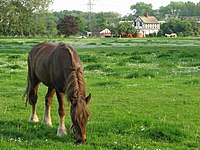Grazing rights

Grazing rights mean that someone has permission to let their animals (like cows, sheep, or horses) eat the grass or other plants on a piece of land that belongs to someone else. It's like borrowing a toy from a friend, but instead of a toy, you borrow a part of a field so your animals can eat the plants there.
The person who owns the land gives the person with the animals permission to use the land, usually for a certain amount of time. This can be a month, a season (like summer or winter), or even for several years. The person with the animals might have to pay the landowner for this permission, or they might have a special agreement that they don't have to pay.
Grazing rights can be important for people who raise animals because they need enough grass and other plants for their animals to eat. If they don't have enough land to let their animals graze, they might have to buy expensive feed or move their animals to a different area. Grazing rights can also help landowners by keeping their land tidy and free from overgrown plants.
Just like with borrowing a toy, there are rules that need to be followed when you have grazing rights. For example, the person with the animals needs to make sure their animals don't damage the land or eat too much of the plants. They might also have to move their animals to a different area if the landowner needs to use that part of the land for something else.
Overall, grazing rights are a way for people to share land, so that animals can have enough food to eat and the land can stay healthy and well-maintained.
The person who owns the land gives the person with the animals permission to use the land, usually for a certain amount of time. This can be a month, a season (like summer or winter), or even for several years. The person with the animals might have to pay the landowner for this permission, or they might have a special agreement that they don't have to pay.
Grazing rights can be important for people who raise animals because they need enough grass and other plants for their animals to eat. If they don't have enough land to let their animals graze, they might have to buy expensive feed or move their animals to a different area. Grazing rights can also help landowners by keeping their land tidy and free from overgrown plants.
Just like with borrowing a toy, there are rules that need to be followed when you have grazing rights. For example, the person with the animals needs to make sure their animals don't damage the land or eat too much of the plants. They might also have to move their animals to a different area if the landowner needs to use that part of the land for something else.
Overall, grazing rights are a way for people to share land, so that animals can have enough food to eat and the land can stay healthy and well-maintained.
Related topics others have asked about:
